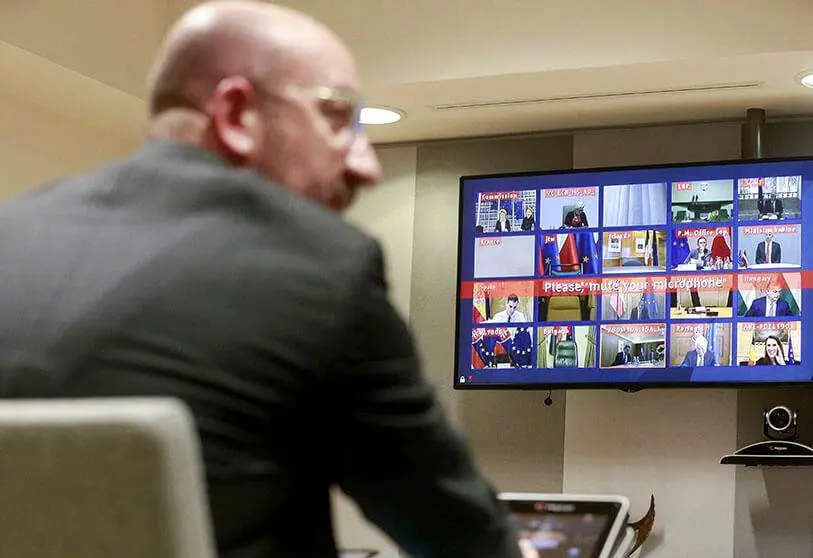Europe prepares to rebuild the continent after the pandemic

It is often said that after the storm comes the calm. In the case of Europe, after the pandemic comes reconstruction. The European bodies are already preparing ambitious economic plans once the health crisis is over. Although significant agreements have been reached in recent weeks, some details have yet to be finalised as to the conditions under which the funds will be delivered and the amount of money involved. Although the beginnings of the spread of the virus in the EU countries were characterised by confusion and a lack of coordination between the members of the European Union, the whole machinery in Brussels has been set in motion to bring the economy back into full swing once the quarantines in the Member States are over.
The rapid spread of the pathogen knocked out the EU's ability to act at first. Agreements are the norm and reaching immediate decisions is complicated by the involvement of up to 26 countries in the process. "The EU came late to the start of the pandemic. There was a lack of coordination in closing borders and some members, such as France, Germany and the Czech Republic, announced restrictions on exports of medical equipment, Miguel Ángel Benedicto, professor of international relations at the European University of Madrid, told Atalayar.
The EU's image was further tarnished after China and Russia sent medical material. "The Asian giant took advantage of the confusion to launch a powerful public diplomacy campaign and to distance itself from its responsibility as the focus of the pandemic," the university professor assures.
Despite initial errors, the EU has organised transport routes to allow the arrival of health supplies, launched a common fund to help the unemployed and moved patients from one country to another to relieve the saturation of intensive care units. "The reaction this time has been very quick. We have learned from the crisis in 2008, on that occasion it took almost four years to organise a rescue fund for countries in difficulty," Jonas Fernandez, MEP of the Progressive Alliance of Socialists and Democrats and member of the Economic and Monetary Affairs Committee told Atalayar.

Benedict also agrees on this point. "Times in the European Union are slow, but this time there has been a faster response than the last crisis and there has been better coordination between states," he explains. "The apology by Ursula Von der Leyen, president of the European Commission, to the countries of the south was very appropriate," he says.
It is worth remembering that in mid-March the European Parliament approved a package of up to 37 billion euros to be spent exclusively on health spending. "Although Chinese masks have been seen, the European Parliament has also done its part and has made funds more flexible to deal with the health crisis," defends Fernández.
In addition to healthcare material, the EU has introduced new mechanisms to facilitate the arrival of aid, such as the Sure programme. Up to 100 billion euros have been mobilised so that countries can finance part of the ERTE. "The aim is to help Italy, Spain and all the other countries that have been hard hit," said Ursula von der Leyen when she announced the proposal.
The European Investment Bank has put up to 200 billion euros in guarantees and collateral to enable commercial banks to access credit and the MEDE (Financial Stability Facility), launched during the last euro crisis to revive countries with excessive deficits and provide them with financing, has relaxed its requirements with lower interest rates, according to MEP Jonás Fernández. Meanwhile, the ECB, which was about to start withdrawing the stimulus put in place during the last period of crisis, has made available up to 750 billion for the purchase of debt, both public and private.

Similarly, the European Council, meeting by video conference, gave the green light on Thursday to a European programme to set up a fund of up to EUR 1.5 million to be supported by the EU's multi-annual budget. The president of the body, Belgian Charles Michel, was optimistic and hopeful about the progress of talks to prepare a response to the economic crisis that is once again looming over the continent.
"There is a consensus among all the countries on this reconstruction fund. But the amount of the fund has yet to be determined," explains Fernández. The idea of this new mechanism is to launch a European debt on the markets. "Previously, debt had already been issued formally, but never in such a large amount. This agreement means a greater commitment," says the Socialist MEP.
The battery of economic measures has not prevented many European citizens from feeling unprotected in this crisis. "The EU has failed to communicate better. It has focused on economic programmes and lacked a soul and confidence. This is something that needs to be worked on in the future, as the union is much more than an economic club," concludes Benedict.








